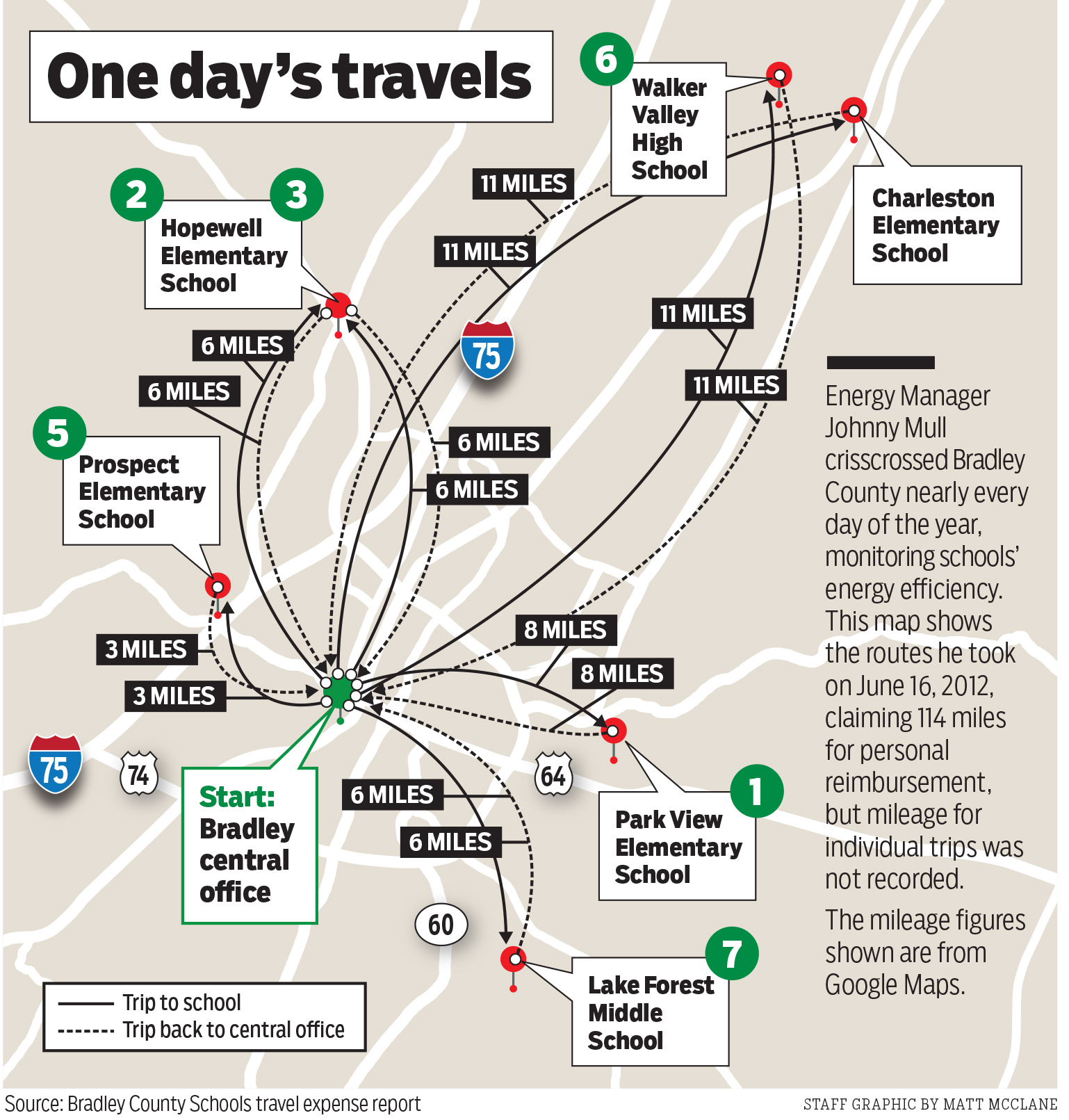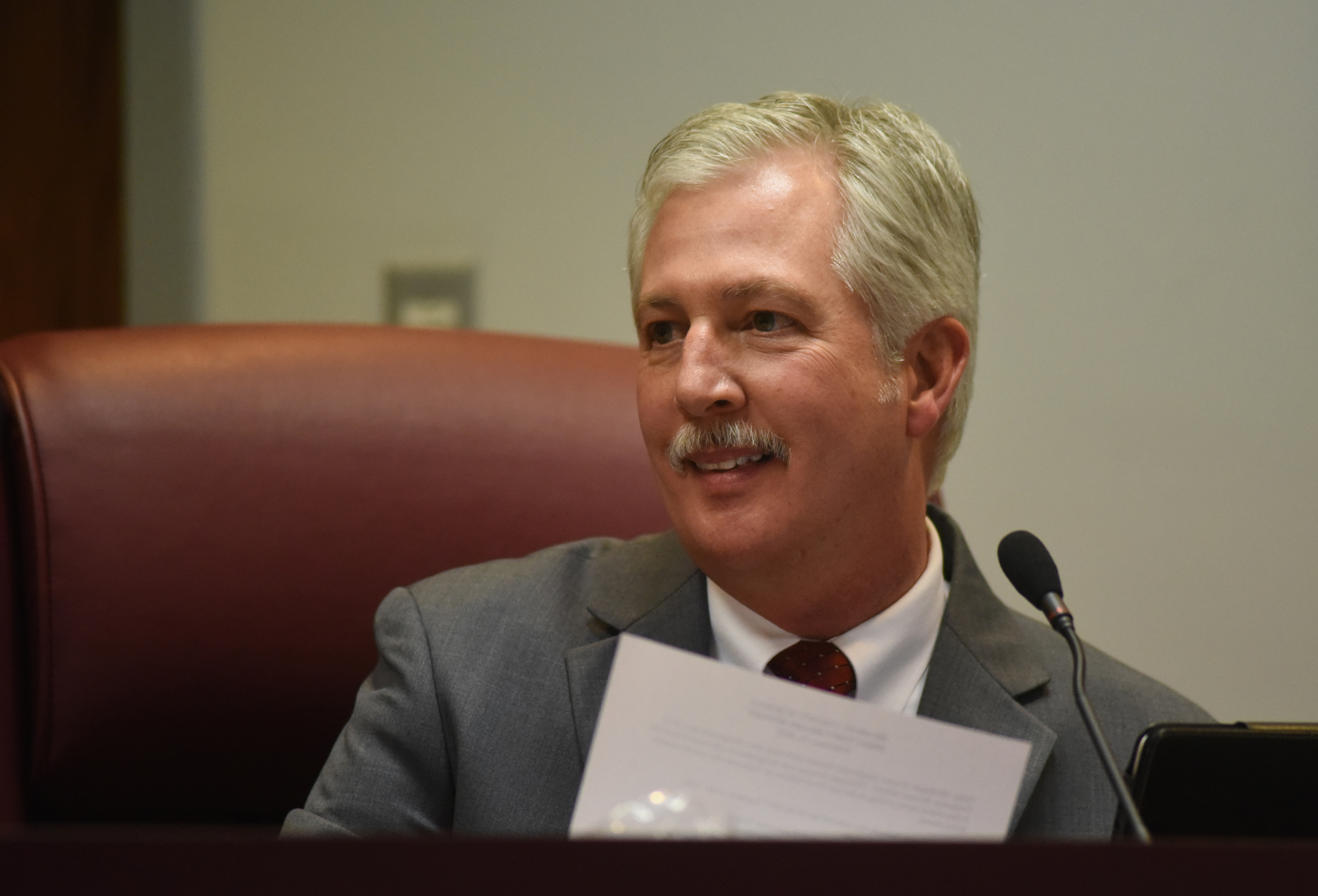CLEVELAND, Tenn. -- They compared the school board to Nazis. They cited Bible verses and donned black T-shirts. Outside the Bradley County Schools central office, teachers, parents and kids held picket signs Thursday evening hoping to save their superintendent of seven years, Johnny McDaniel.
"Let our leader lead! You leave!"
"Keep Johnny Mac"
"We choose his vision not yours"
It may seem surprising that the 2013 Tennessee Superintendent of the Year now has a target on his back. But even his supporters say his days are numbered. Last week, school officials announced the board would explore buying out McDaniel's contract, which runs until June 30, 2016.
But roots of the controversy have been growing for years.
Three of seven school board seats have turned over in the last few years.
Some newly elected board members and McDaniel didn't line up on Common Core state standards.
Some thought the superintendent was too loose with taxpayer money and wasn't forthcoming during the budget process. And they saw his decision to fire a teacher -- who a judge ultimately ordered reinstated -- as an embarrassment and a waste of school resources.
McDaniel touted improved graduation rates, while some board members questioned the district's rates of student achievement and college readiness.
But it was the ongoing controversy known here as "Travelgate" that is coming back to haunt the superintendent. The issue revolved around tens of thousands of dollars in travel expense payments for a central office administrator. Those were payments that McDaniel personally approved for years.
McDaniel did not respond to multiple requests for comment for this report.
Records show the school energy manager, Johnny Mull, was paid more than $33,000 in tax-free mileage reimbursement over three years for supposedly driving nearly 100,000 miles crisscrossing Bradley County. He submitted, and McDaniel signed off on, records that claim he worked holidays, vacation days and most weekends. He even claimed to have worked a 160-day stretch with no time off.
"I felt like I was doing my job," said Mull, who was a teacher and coach before he took the job as energy manager, and who was elected to the Bradley County Commission in August.
"It was stealing, in my opinion," said school board Chairman Nicholas Lillios. "It was out-and-out theft."
And he's worried there could be more skeletons in the superintendent's closet.
Mull was hired by the Bradley County school system in 1987 as a history teacher and football coach. He taught at Bradley Central High School until 1999 when, he said, he noticed an advertisement in the hallway for a new energy manager -- the first such school position in Tennessee. He says he competed against 38 people and got the job after three rounds of interviews, though a review of his personnel file shows no application or contract for the position. His pay that year was bumped from about $39,000 to about $48,000 annually.
His task was to develop an energy management plan that would save money, specifically "for the purpose of transferring dollars from the utility budget into the instructional budget," according to the job description.
Upgrades to windows and air conditioners and strict thermostat controls have saved $13 million since he started the position, Mull said. He says he drives around the county to leave notes in classrooms if teachers leave desktop monitors and DVD players running or leave lights on. He said he likes to check to see if thermostats, which are controlled and monitored at the central office, are working.
While energy costs went down, Mull's travel reimbursement grew.
Between the 2010-11 and 2012-13 school years, Mull was paid more than $33,000 -- more than the combined travel compensation of seven other central office administrators who also travel among schools, including the superintendent. That reimbursement is on top of Mull's 2013-14 salary of more than $72,000.
But it wasn't just the sheer amount of miles and money that triggered suspicion.
His expense reports show him driving a spoke-and-wheel pattern: From central office to a school, back to central office and then to another school, back and forth, even when two schools might be only minutes apart. It was his daily routine for years.
His expense reports claimed mileage on Thanksgiving Day, Easter, New Year's Day and Independence Day. Even on paid vacation days, he collected reimbursement for hundreds of miles driven. In 2012-13, he claimed to have worked 160 days, including weekends, with not a single day off.
He didn't have to document odometer readings, but his paperwork claims he averaged between 2,400 and 2,900 on-the-clock miles a month, taking home between $570 and $1,211 in tax-free expense checks.
As Mull's direct supervisor, the superintendent signed off on each expense report.
A school board inquiry in the summer of 2013 couldn't verify whether Mull's records were accurate, but McDaniel did put the energy manager on a tighter leash.
Then and now Mull maintained that the mileage records honestly depict the work he did and the miles he drove.
"I don't have anything to hide," he said last week.
The mileage checks might have gone unnoticed. But in the spring of 2013, while preparing the schools budget for the coming fiscal year, board minutes show school officials tried to increase Mull's travel budget from $11,000 to $14,000, though all other travel line items remained constant. That raised eyebrows among some school board members, and led to a wider debate about the school system's budget.
McDaniel wanted to give employees a 2 percent raise. Board member Chris Turner, a consistent McDaniel critic, questioned the raises and asked if some of the money could be better spent on other things, such as capital improvements.
"It is a priority for me to help our teachers and employees," McDaniel said, according to meeting minutes. "They make a difference every day."
That June, questions came up about Mull traveling to 25 locations on the day after Christmas, logging 209 miles. Lillios pointed out a week's worth of mileage logs in December 2012 when Mull supposedly logged 592 miles, which Lillios estimated would have come to about 24 hours of driving.
McDaniel verified his signature on Mull's expense reports, but said he was not with Mull to verify the travel. He said Mull assured him the mileage was accurate.
Bradley County consistently posts video recordings of school board meetings online. But the recording of the June 2013 meeting -- when the issue came to a head -- ends abruptly before conversation about "Travelgate" began. However, the minutes show that Lillios warned McDaniel that if travel was being used to bolster Mull's salary, he would "have none of that."
Board member Rodney Dillard, a McDaniel supporter, said the inquiry appeared to be a personal attack, minutes show. The meeting concluded with a 4-2 vote to have then-chairman Charlie Rose meet with Mull and McDaniel to look into the issue.
In subsequent meetings, the board debated the extension of McDaniel's contract and his evaluation. It became evident that the superintendent and the board were not on the same page.
In July 2013, McDaniel explained he had been working toward goals set by the previous board. Lillios and Turner joined the board in 2012, and by the time Dianna Calfee joined in 2014 the politics of the board had shifted. McDaniel asked for specific direction from his new bosses.
"Mr. Rose stated the board goals and director's goals could not be in conflict," the minutes show.
In August 2013, Rose presented his report on Mull's travel to the board. Rose noted that Mull had been cooperative. The report found there was no way to prove Mull did or didn't drive those miles. He couldn't verify which buildings Mull visited or when. All that was confirmed was the thousands Mull had been raking in.
"The evidence is, at best, inconclusive," Rose wrote.
Still, the school board demanded a change. Just days before Rose issued his report, McDaniel gave Mull a laptop, a district vehicle and a gas card. He was told he would no longer receive reimbursement for his personal vehicle, and that his travel log and expenses would be monitored.
After that, Mull's travel changed drastically.
Mull says he just wanted to do his best and save the schools money. If anything, he admits he may have worked -- and driven -- too much. But he said there was nothing nefarious with his expense checks. And he has nothing to hide.
"Maybe I was overzealous or something, but I was trying to keep records of everything I had for them to go through and look through," he said.
In the 2013-14 school year, driving a school-issued 1998 Chevy van and using a school-issued gas card, Mull's travel log shows he drove 1,303 miles. That was a 96 percent decrease from the previous year, when he racked up 33,916 miles. His gas card costs for the year totaled $349.94, plummeting from the $12,209.76 in mileage reimbursements the previous year.
This school year, Mull said he decided to resume using his personal vehicle, but not to seek mileage reimbursement from the school system. He said the move was aimed at improving efficiency and effectiveness.
"I just didn't want all the scrutiny," Mull said. "I just decided I'll scale back somewhat and still go, and any mileage that I have, I'll deal with it personally."
Though the issue of Mull's travel has died down, it's clearly still a concern for some board members.
"I think that was the beginning of the board paying closer attention to the budgeting process, as we should," said board member Vicky Osment Beaty.
At Thursday's school board meeting, McDaniel's proposed buyout wasn't addressed, though dozens of McDaniel supporters crammed into the meeting room. They addressed the board and left copies of a petition with more than 1,200 signatures asking for McDaniel to stay.
"If we relieve our captain of his duty, it will have great detrimental effect on our children and you will have given away the most effective teacher Bradley County has to offer," Park View Elementary School teacher Courtney Fowler said.
Board members Dillard and Christy Critchfield, two McDaniel supporters, were absent from the board meeting, leaving a wide gap between McDaniel's seat at the dais and the five other board members. Critchfield couldn't be reached for comment. McDaniel quickly left through a back door as soon as the meeting was adjourned.
Dillard said he has no idea what's going on with the buyout -- it's being handled by other board members. But he said the issue of Mull's travel was blown out of proportion.
"It's done. The past is the past," he said. "Mr. McDaniel took the steps the board asked him to take."
Lillios said he knows it will be costly to buy out the contract of McDaniel, who earns about $120,000 plus benefits. But he says taxpayers will ultimately win with a more fiscally responsible superintendent.
The board will meet on Feb. 24 to consider the buyout. Board members know McDaniel's departure is hard for some teachers and parents. It's been emotional and personal. Teachers blame certain board members for bringing personal vendettas to the table.
But Lillios points out that McDaniel initiated the buyout process.
While it may seem like a drastic change of direction at the top, he said new board members have been slowly realigning the school system's course for months.
"The change of leadership has already taken place," he said.
Contact staff writer Kendi Anderson at kendi.anderson@timesfrepress.com or 423-757-6592.
Contact staff writer Kevin Hardy at khardy@timesfreepress.com or 423-757-6249.




